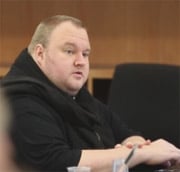 In 2012, Megaupload was shut down in a massive international operation. At the time the file-storage site had been one of the most-visited on the planet with around 100 million users.
In 2012, Megaupload was shut down in a massive international operation. At the time the file-storage site had been one of the most-visited on the planet with around 100 million users.
U.S. authorities subsequently claimed that Megaupload illegally generated more than US$175 million and cost copyright owners more than $0.5bn in lost business.
The former operators of Megaupload – Kim Dotcom, Mathias Ortmann and Bram van der Kolk – insist that their business was a completely legal cloud storage platform so any infringement carried out by their users was not their responsibility. They are all fighting their cases from New Zealand where they are residents.
Last December, after almost ten weeks of hearings, District Court Judge Nevin Dawson found there was an “overwhelming” case for Kim Dotcom, Mathias Ortmann and Bram van der Kolk, to be extradited to the United States. There they face decades in jail on various charges including copyright infringement, money laundering, and racketeering.
Today, around a dozen lawyers were present in New Zealand’s High Court as Dotcom and his former colleagues mounted a formal appeal of last year’s extradition decision. The trio say that Judge Nevin Dawson didn’t give them a fair hearing.
The appeal is expected to last six to eight weeks but it began without Dotcom in attendance. He arrived after the hearing began and sat at the back with girlfriend Elizabeth Donelly. NZ’s Radio Live reported that the Megaupload founder appeared “relaxed”.
While Dotcom was not presenting argument today his lawyer Ron Mansfield told the court that due to the unprecedented issues involved and the international interest in the case, the hearing should be live streamed.
Mansfield said that a complex case of this nature is unlikely to receive balanced reporting so a live stream could ensure that all information is made available for public scrutiny. That could be done via YouTube, he said, with a 10-minute delay to ensure any sensitive material could be withheld.
A decision on that request wasn’t made right away, however. Judge Murray Gilbert said that the streaming request had been submitted late so he wanted to give representatives from the media time to consider the request and make their submissions. As previously reported, the United States government is objecting to the application.
Public interest in the case is undoubtedly high. Dotcom has become somewhat of a celebrity locally in New Zealand and he has a huge profile online as a serial entrepreneur, privacy activist, and video gamer. Unsurprisingly the public gallery in the High Court was full, with one man reportedly standing outside waving a banner claiming that Dotcom’s persecution is part of a CIA conspiracy.
With Dotcom not expected to speak until later next week, the hearing began with representation from Grant Illingworth QC, the lawyer representing Mathias Ortmann and Bram van der Kolk.
Illingworth said that the hearing had been unfair since the United States had denied the defendants the opportunity to hire specialist US-based technology experts who could help to support their defense.
He said that the case against the former Megaupload operators “had gone off the rails” and their extradition should be halted since the District Court had shown “extraordinary disinterest” in their arguments at the earlier hearing.
“It’s like ships passing in the night with no radar — the judge simply did not engage with the arguments in a meaningful way,” Illingworth said.
Pointing to alleged breaches of conduct by U.S. authorities, Illingworth
said that a situation of urgency had been manufactured in order to achieve procedural shortcuts.
There had been a “covering up” of unlawful activities preceding the arrests in 2012 and “downstream attempts to cover that up including a police officer giving incorrect information to this court, [and] unlawfully sending clones of hard drives overseas.”
Arguments for Mathias Ortmann and Bram van der Kolk are expected to take around eight days but the whole process is forecast to be a drawn-out affair. In the District Court the extradition hearing was supposed to take four weeks but actually took ten.
This time around the actions of the District Court will be picked over in fine detail, concentrating closely on numerous matters of law.
The United States Department of Justice isn’t expected to begin its arguments for another three weeks or so.
The hearing continues tomorrow but it’s unlikely that any final decision will arrive even this year. Dotcom and his rivals in the US both seem prepared to take this battle all the way to the Supreme Court in New Zealand if necessary. That could take years.





